|
|
|
Sort Order |
|
|
|
Items / Page
|
|
|
|
|
|
|
| Srl | Item |
| 1 |
ID:
125195
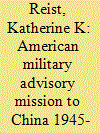

|
|
|
|
|
| Publication |
2013.
|
| Summary/Abstract |
The Pacific War ended in 1945 before the American government had established a plan for the implementation of its postwar goals for its relationship with China. Although China lacked unification, the Guomindang (GMD), the "allied" government, sought to create a more modern military along American lines, with American equipment, using American advisers and funding. GMD leaders did not want American influence or control, desiring to maintain their culturally organized structures and ways of functioning, including the use of guanxi (personal networks and favors). The Joint U.S. Military Advisory Group attempted to operate within this nexus of conflicting goals, purposes, and missions.
|
|
|
|
|
|
|
|
|
|
|
|
|
|
|
|
| 2 |
ID:
123711
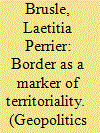

|
|
|
|
|
| Publication |
2013.
|
| Summary/Abstract |
This paper considers the film Frozen River (2008) for the purpose of considering how the US-Canadian border is dramatised within the context of two women caught up in a illicit trading of migrants via a Native American Reservation. Re-calibrating more mainstream Hollywood's fascination with the United States' southern border, Frozen River usefully focuses attention on two areas that deserve further reflection namely the materiality of borders and border crossings and biopolitics. The paper concludes with some reflections on how borders, biopolitics, dispossession and sovereignty need further theorization by political geographers and other scholars.
|
|
|
|
|
|
|
|
|
|
|
|
|
|
|
|
| 3 |
ID:
124657
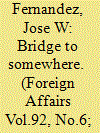

|
|
|
|
|
| Publication |
2013.
|
| Summary/Abstract |
International development has moved beyond charity. Gone are the days when the United States would just spend its seemingly bottomless largess to help less fortunate or vanquished countries, as it did after World War II. International development has reached a new, globally competitive stage, bringing with it enormous strategic and economic implications for the United States in the years ahead.
According to the Organization for Economic Cooperation and Development (OECD), the global middle class will grow from an estimated 1.8 billion people in 2009 to 4.9 billion in 2030. Nearly all of that growth will occur outside Europe and North America, from Brazil, China, and India to countries in the Middle East, North Africa, and Southeast Asia. Eighty-five percent of the growth will come in the Asia-Pacific region alone. The priorities of those countries will change along with their demographics. With more people escaping poverty, governments' focus is shifting from meeting basic needs to ensuring longer-term economic prosperity. Instead of handouts, nations are looking for investments to keep their middle classes employed. And more often than not, those investments are for infrastructure that enables and sustains growth.
|
|
|
|
|
|
|
|
|
|
|
|
|
|
|
|
| 4 |
ID:
124847
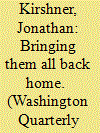

|
|
|
|
|
| Publication |
2013.
|
| Summary/Abstract |
A generally underappreciated shift in U.S. engagement with the global macroeconomic order, accelerated by the global financial crisis, has complicated managing the dollar as a global currency and placed new, politically unfamiliar constraints on U.S. power.
|
|
|
|
|
|
|
|
|
|
|
|
|
|
|
|
| 5 |
ID:
124876
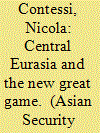

|
|
|
|
|
| Publication |
2013.
|
| Summary/Abstract |
In the 20 years since independence from the former Soviet Union, the study of Eurasia in International Relations (IR) has received considerable impetus in both the academic and policy circles. Specialized news and analysis outlets have come online, research centers have multiplied within universities, and a variety of think tanks now host dedicated programs. In other words, this still relatively little-known region has glamour. Yet Eurasia remains difficult to situate as an object of study due to its distinctive hybridity: geographical, at the crossroads between Europe and Asia; cultural, Muslim Russianspeaking Turkic peoples with Asian traits and traditions; political, straddling Western and Asian institutional forms domestically, and contiguous to Europe, Asia, Russia, the Middle East, and Afghanistan internationally. Partly as a result of this hybridity, Eurasia is a somewhat elusive object of study. At a minimum, it comprises the two subregions on each shore of the Caspian basin: Central Asia to the east and the Caucasus to the west. Reflecting this elusiveness, Central Asian states (CAS) belong to the Asia-Pacific Regional Group at the United Nations; they are members of the Asian Development Bank and the Economic Commission for the Asia-Paci?c. At the same time, they are members of the Organization for Security and Cooperation in Europe (OSCE), the European Bank for Reconstruction and Development, and the Euro-Atlantic Partnership Council, a North Atlantic Treaty Organization (NATO) ancillary forum. But they also have distinctly Central Asian groupings, such as the Eurasian Development Bank, the UN-af?liated Central Asian Regional Information and Coordination Center, not to mention the Shanghai Cooperation Organization (SCO) and Collective Security Treaty Organization (CSTO). Similarly, the three Caucasian states share most of the same af?liations, except for belonging to the East European Regional Group at the UN
|
|
|
|
|
|
|
|
|
|
|
|
|
|
|
|
| 6 |
ID:
124765
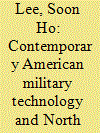

|
|
|
|
|
| Publication |
2013.
|
| Summary/Abstract |
Protected by networks of hard and deeply buried facilities, North Korea's asymmetric warfare assets have emerged as a real threat to the U.S.-Republic of Korea (ROK) alliance. As a solution, the U.S.-ROK alliance has developed military technologies to defeat North Korea's hard and deeply buried targets (HDBTs). However, questions remain regarding the efficiency of those technologies. By examining the contemporary status of North Korea's HDBTs and U.S. military technologies, this article proves that these newly developed military technologies are not very effective and that heavy reliance on technology is not a viable solution to North Korea's HDBTs.
|
|
|
|
|
|
|
|
|
|
|
|
|
|
|
|
| 7 |
ID:
124650


|
|
|
|
|
| Publication |
2013.
|
| Summary/Abstract |
The United States is now in a period of austerity, and after years of huge increases, the defense budget is set to be scaled back. Even those supporting the cuts stress the need to avoid the supposedly awful consequences of past retrenchments. "We have to remember the lessons of history," President Barack Obama said in January 2012. "We can't afford to repeat the mistakes that have been made in the past -- after World War II, after Vietnam -- when our military policy was left ill prepared for the future. As commander in chief, I will not let that happen again." Similarly, then Secretary of Defense Leon Panetta told Congress in October 2011, "After every major conflict -- World War I, World War II, Korea, Vietnam, the fall of the Soviet Union -- what happened was that we ultimately hollowed out the force. Whatever we do in confronting the challenges we face now on the fiscal side, we must not make that mistake."
|
|
|
|
|
|
|
|
|
|
|
|
|
|
|
|
| 8 |
ID:
123719
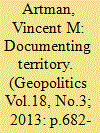

|
|
|
|
|
| Publication |
2013.
|
| Summary/Abstract |
Despite the crucial role it played in the 2008 war between Russia and Georgia, the phenomenon of passportisation has not received a great deal of scholarly attention. Much of the literature has treated the mass distribution of Russian passports to the residents of Abkhazia and South Ossetia as little more than a strategy to manufacture an excuse to go to war with Georgia. Drawing on recent scholarship on territory and territoriality, as well as with literature addressing Agamben's theories of exceptional spaces, this paper contributes to a more nuanced understanding of passportisation by analysing the territorial effects it produced. It argues that the wholesale conversion of Abkhazians and South Ossetians into Russian citizens did not merely manufacture a casus belli, it also produced exceptional spaces within the territory of the Republic of Georgia, where the norms of international law and the modern state system were effectively suspended.
|
|
|
|
|
|
|
|
|
|
|
|
|
|
|
|
| 9 |
ID:
124578


|
|
|
|
|
| Publication |
2013.
|
| Summary/Abstract |
The debate around humanitarian intervention and the responsibility to protect generally concerns a collective action problem on the international level: motivating states to participate in a multilateral coalition to stop a mass atrocity. This debate presupposes that states enjoy a domestic consensus about their rights and responsibilities to intervene. This article reconsiders this assumption and examines the sources of domestic political will for intervention, particularly the role of partisanship, ideology, and public opinion on Congressional members' willingness to support US intervention for humanitarian purposes. We analyze several Congressional votes relevant to four episodes of US humanitarian intervention: Somalia, Haiti, Bosnia, and Kosovo. We find that public support for humanitarian intervention increases Congressional support and that other political demands, primarily partisanship and ideological distance from the president, often trump the normative exigencies of intervention. Our findings shed light on the domestic political dynamics behind humanitarian intervention and can help explain why some recent humanitarian missions have proceeded without seeking Congressional approval.
|
|
|
|
|
|
|
|
|
|
|
|
|
|
|
|
| 10 |
ID:
124729
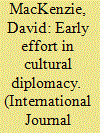

|
|
|
|
|
| Publication |
2013.
|
| Summary/Abstract |
The Canadian Co-operation Project (CCP) was one of the more unusual episodes in the economic and cultural relationship of Canada and the United States. Conceived between the federal government and the Hollywood film industry, the 1948 agreement called on Hollywood to produce more films in Canada and to make efforts to promote American tourism in Canada. The paper argues that the CCP was less the surrender to Hollywood than is generally understood and more an early example of cultural diplomacy in which the Canadian government used cultural relations with the United States for its own ends, primarily the promotion of tourism in Canada
|
|
|
|
|
|
|
|
|
|
|
|
|
|
|
|
| 11 |
ID:
124635
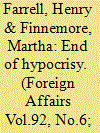

|
|
|
|
|
| Publication |
2013.
|
| Summary/Abstract |
The U.S. government seems outraged that people are leaking classified materials about its less attractive behavior. It certainly acts that way: three years ago, after Chelsea Manning, an army private then known as Bradley Manning, turned over hundreds of thousands of classified cables to the anti-secrecy group WikiLeaks, U.S. authorities imprisoned the soldier under conditions that the UN special rapporteur on torture deemed cruel and inhumane. The Senate's top Republican, Mitch McConnell, appearing on Meet the Press shortly thereafter, called WikiLeaks' founder, Julian Assange, "a high-tech terrorist."
|
|
|
|
|
|
|
|
|
|
|
|
|
|
|
|
| 12 |
ID:
124725
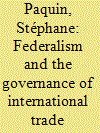

|
|
|
|
|
| Publication |
2013.
|
| Summary/Abstract |
When the European Union (EU) and the Canadian government announced the launching of negotiations to create a "new generation" free trade agreement, the EU insisted that provincial representatives be included on the Canadian negotiating team. The goal of this article is to explain why the provinces have gradually become key, indeed indispensable, actors in international trade negotiations. I examine how international trade negotiations are conducted in Canada, noting the enhanced role for provincial governments, and I focus on a comparison between the Canada-US free trade negotiations and the discussions for a Comprehensive Economic and Trade Agreement (CETA) with Europe.
|
|
|
|
|
|
|
|
|
|
|
|
|
|
|
|
| 13 |
ID:
124616
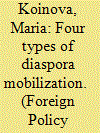

|
|
|
|
|
| Publication |
2013.
|
| Summary/Abstract |
This comparative study explores the conditions and causal pathways through which conflict-generated diasporas become moderate or radical actors when linked to homelands experiencing limited sovereignty. Situated at the nexus of scholarship on diasporas and conflict, ethnic lobbying in foreign policy, and transnationalism this article develops four types of diaspora political mobilization-radical (strong and weak) and moderate (strong and weak)-and unpacks the causal pathways that lead to these four types in different political contexts. I argue that dynamics in the original homeland drive the overall trend towards radicalism or moderation of diaspora mobilization in a host-land: high levels of violence are associated with radicalism, and low levels with moderation. Nevertheless, how diaspora mobilization takes place is a result of the conjuncture of the level of violence with another variable, the linkages of the main secessionist elites to the diaspora. The article uses observations from eight cases of Albanian diaspora mobilization in the US and the UK from 1989 until the proclamation of Kosovo's independence in 2008.
|
|
|
|
|
|
|
|
|
|
|
|
|
|
|
|
| 14 |
ID:
123715
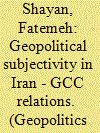

|
|
|
|
|
| Publication |
2013.
|
| Summary/Abstract |
This article enters into the debate about geopolitical subjectivity between Iran and the members of the Gulf Cooperation Council (GCC) on the three islands issue. The islands at the Western entrance to the Strait of Hormuz have so far been examined as an issue between Iran and the United Arab Emirates from historical, sovereignty and law perspectives, but this article examines the argument that the GCC has become a geopolitical subject through its support for the US policy of isolating Iran. Geopolitical subjectivity, a concept building on Pami Aalto's conceptual scheme, is the concept of goal-oriented ordering of territories and political space. We can use it to identify the GCC institution as a subject with the ability to act (and abstain from acting) and to examine Iran's response to the GCC's willingness to order the three islands. The conclusion is that the GCC became a subject in this context as soon as it felt the benefits of US support and the current rise of the soft power of Qatar. Even so, it has been unable to undermine Iran's sovereignty rights over the three islands, and the issue has strengthened, even exaggerated, states' adherence to the concept of sovereignty throughout the Persian Gulf region.
|
|
|
|
|
|
|
|
|
|
|
|
|
|
|
|
| 15 |
ID:
124715
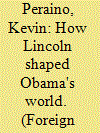

|
|
|
|
|
| Publication |
2013.
|
| Summary/Abstract |
ONE DAY during the Civil War, a group of men arrived at the White House demanding to see Abraham Lincoln. They were determined, they told the U.S. president, to get their man appointed as a diplomat in the Sandwich Islands--modern-day Hawaii. After making their case on merit, one of the men added earnestly that their nominee was in poor health and that the balmy island weather would do him good. Lincoln wasn't buying it. "Gentlemen," he said before sending them on their way, "I am sorry to say that there are eight other applicants for that place, and they are all sicker than your man."
|
|
|
|
|
|
|
|
|
|
|
|
|
|
|
|
| 16 |
ID:
125496
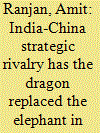

|
|
|
|
|
| Publication |
2013.
|
| Summary/Abstract |
Has China replaced or is an the process of "replacing" strategic presence of India in South Asia, is the most pertinent question, which keeps the Indian strategic community busy. It is known fact that since ancient time South Asia, as a region, had been under the influence of India; but things change since beginning of the Cold War.
|
|
|
|
|
|
|
|
|
|
|
|
|
|
|
|
| 17 |
ID:
124746
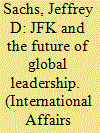

|
|
|
|
|
| Publication |
2013.
|
| Summary/Abstract |
On 10 June 1963 President John F. Kennedy gave a speech that changed the world. His commencement speech at American University helped to spur the signing of a world-changing agreement between the Soviet Union and the United States-the Partial Nuclear Test Ban Treaty. This episode of peacemaking is remarkable for two reasons. First, it arguably helped to save the world, since the nuclear confrontation at that stage of the Cold War was not a 'stable balance of terror', as sometimes described, but rather a highly unstable situation that was prone to accidents, misjudgements and potential disasters. Second, this was an episode of statesmanship in which presidential leadership played a crucial role. Following the Cuban Missile Crisis, Kennedy understood that he bore sole responsibility on the US side to find a way back from the brink of nuclear war. He used the 'peace speech' to create a novel kind of peace diplomacy, and worked together with his counterpart, Soviet leader Nikita Khrushchev, to pull the superpowers back from this precarious brink.
|
|
|
|
|
|
|
|
|
|
|
|
|
|
|
|
| 18 |
ID:
124745
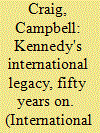

|
|
|
|
|
| Publication |
2013.
|
| Summary/Abstract |
This article explores historical assessments of the foreign policy of President John F. Kennedy, who was assassinated fifty years ago. It traces the evolution of JFK historiography from the uncritical so-called 'Camelot' school to harsh revisionist critiques in the 1980s and 1990s, and on to the current 'third wave' of scholarship. The article focuses in particular on new work concerning JFK's handling of the Berlin and Cuba superpower crises, his role in expanding the United States' involvement in Vietnam (and whether blame for this war can be assigned to him) and larger questions about his approach to the danger of nuclear holocaust and the possibility of defusing Cold War tensions. The conclusion to the article examines his various peace-seeking initiatives in the months following the Cuban Missile Crisis, and suggests that Kennedy may have been turning towards a more critical view of American Cold War politics when he was killed in Dallas in November 1963
|
|
|
|
|
|
|
|
|
|
|
|
|
|
|
|
| 19 |
ID:
124721
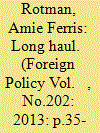

|
|
|
|
|
| Publication |
2013.
|
| Summary/Abstract |
At the sprawling Bush market deep within Afghanistan's capital, the American war is for sale. The maze of some 500 interconnected stores, named for the US president who invaded in 2001, is a chaotic emporium brimming with goods carted in by truck to supply NATO troops. For more than one decade, thousand of vehicles have crossed the border with Pakistan each month, barring food and supplies that are in turn pilfered, repurposed with price tags and put on display under the baking sun: Pop-Tars, Maxwell house coffee canisters and squeeze bottles of maple syrups alongside military fatigues, body armor night vision goggles GPS devices and even some automatic rifles.
|
|
|
|
|
|
|
|
|
|
|
|
|
|
|
|
| 20 |
ID:
124705
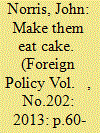

|
|
|
|
|
| Publication |
2013.
|
| Summary/Abstract |
WITH THIS SUMMER'S news from the United Nations that Mexico has surpassed the United States in adult obesity levels--one-third of Mexican adults are now considered extremely overweight--U.S. foreign policy has come into sharper, or perhaps softer, focus. Despite first lady Michelle Obama's continued emphasis on good diet and exercise, the United States seems secretly intent on fattening everyone else on the planet. Apparently, America has adopted the old piece of ursine humor as grand strategy: "You don't have to run faster than the bear to get away. You just have to run faster than the guy next to you."
|
|
|
|
|
|
|
|
|
|
|
|
|
|
|
|
|
|
|
|
|